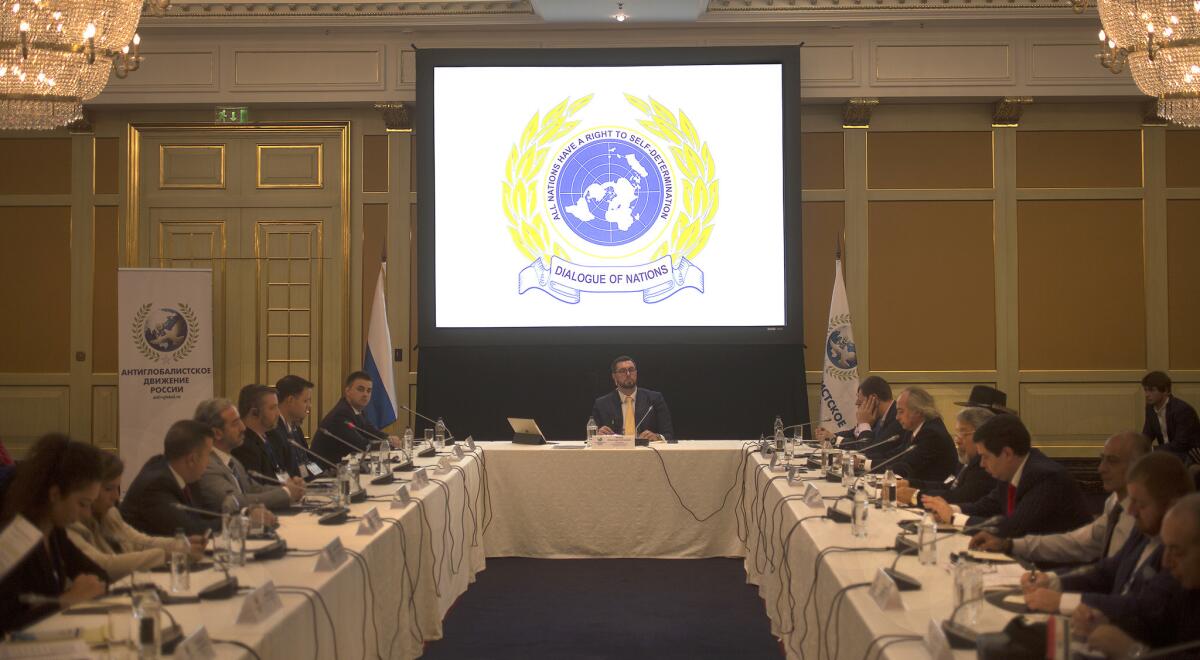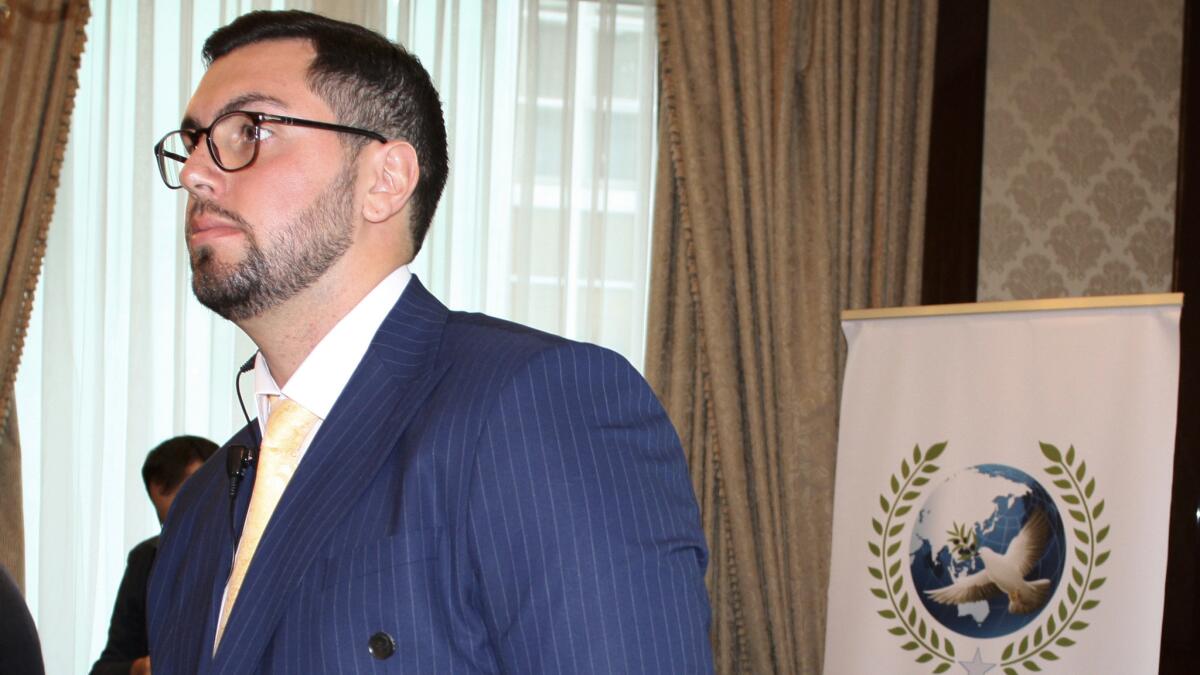Moscow welcomes the (would-be) sovereign nations of California and Texas

- Share via
Reporting from Moscow — The speaker was calling for California’s independence from the United States.
Alexei Gavrilko nodded approvingly. A burly, bearded, camouflage-wearing separatist from eastern Ukraine, he said he had come to the posh Moscow hotel just outside the Kremlin to “communicate with colleagues” representing separatist and secessionist groups from the United States, Europe, the Middle East and the former Soviet Union.
During a conference dubbed the Dialogue of Nations, Gavrilko listened carefully to Louis Marinelli, head of the Yes California group that is determined to hold the Golden State’s “independence referendum” in 2019.
“For the first time in history, we, the people of California, who were conquered and annexed by the American military about 170 years ago, will have a chance to express our voice to either remain a state in the American union, or instead, to pursue a path toward a nationhood,” Marinelli said solemnly.
Gavrilko, who is from the unrecognized but de facto independent Donetsk region, and the entire separatist crowd cheered and applauded. They did it again, louder, when Nate Smith, a self-proclaimed “foreign minister” of the Texas Nationalist Movement, promised that one day, the independent Lone Star state “can formally exchange ambassadors with your free and independent countries.”
The arrival of Californian, Texan, Puerto Rican, Northern Irish, Catalan, Italian and Lebanese secessionists to mingle with activists from several unrecognized separatist territories in former Soviet republics is becoming a tradition as Moscow turns to belligerent, anti-Western nationalism coupled with a readiness to take up arms against its former Soviet vassals.
Moscow uses these gatherings to promote its political agenda, gain more political leverage in the West and push for the lifting of Western sanctions imposed on Moscow after its 2014 annexation of Crimea and support of the separatists in eastern Ukraine, a former lawmaker with the ruling United Russia party said.
“The more the West is disunited, the more beneficial it is to Russia,” Sergei Markov said, adding that the secession of California and Texas — a prospect that would appear to be something of a long shot — would “undoubtedly benefit” the Kremlin.

This was a second conference organized in Moscow by Russia’s Anti-Globalist Movement, a small anti-American group. Its head, Alexander Ionov, said the Kremlin helped fund the conference with a “grant” of $55,000. The rest of the funding came from private donors from “Texas and other countries,” he said.
Last year, the nationalist party Rodina, or Motherland, organized a similar forum that hosted far-right nationalists, neo-Nazis, “Euroskeptics” and separatists in St. Petersburg. Rodina’s founder and de facto leader, Dmitri Rogozin, was Russia’s envoy to NATO and now serves as President Vladimir Putin’s deputy prime minister in charge of the defense industry. The U.S. and the European Union blacklisted him for his role in Russia’s annexation of Crimea.
The separatists and secessionists who gathered in Moscow over the weekend were a somewhat motley crew with diverse agendas and backgrounds.
Italy’s far-right Northern League is light years away from the Polisario Front, which fights for Western Sahara’s independence from Morocco and Mauritania. Ethnic Armenians from Nagorno-Karabakh in the former Soviet republic of Azerbaijan have little in common with Edmund Silva Jr., the “sovereign” of Hawaii, whose video address was played at the conference.
A fierce anti-American stance is, perhaps, their only unifying force – and it perfectly fits the Kremlin’s current foreign policies.
“Many overtly ambitious politicians in the West don’t like what we’re doing today,” said conference organizer Ionov, a stately 7-footer in a bespoke suit and crocodile-leather shoes. “It is unacceptable to renew imperialism in the 21st century, it’s time to get rid of imperialistic whims.”
Western leaders and intelligence services are increasingly concerned about Russia’s widening its support to separatist, isolationist and ultranationalist groups, movements and parties.
In August, presidential hopeful Hillary Clinton called Putin “the grand godfather of this global brand of extreme nationalism.”
Then-British Prime Minister David Cameron said in May that Putin “might be happy” with the Brexit vote for Britain to leave the European Union. Two months earlier, then-British Foreign Secretary Philip Hammond said that “the only country who would like us to leave the EU is Russia.”
In January, Congress instructed James R. Clapper, the U.S. director of national intelligence, to investigate how the Kremlin finances these parties.
“President Putin sees such political forces as useful tools to be manipulated, to create cracks in the European body politic which he can then exploit,” Vice President Joe Biden said in a May 2015 speech at the Brookings Institution, a think tank in Washington.
And although Putin officially distances himself from openly supporting the separatist cause, he occasionally expresses his frustration with the 1991 Soviet collapse – and the subsequent worldwide hegemony of the United States.
“We have heard many times from officials that it’s unfair that Siberia, with its immeasurable wealth, belongs entirely to Russia,” Putin reportedly said in 2014. “Unfair, how do you like that? And grabbing Texas from Mexico was fair!”
The list of Euroskeptic and far-right parties that support Putin includes Jobbik in Hungary, Golden Dawn in Greece, the Freedom Party of Austria and France’s National Front. The latter’s leader, Marine Le Pen, reportedly said she “admired” Putin, admitted to receiving a $12-million loan from a Kremlin-affiliated bank in 2014 – and asked for a $30-million loan in February.
The Kremlin often complains about the “double standards” the West uses when dealing with Russia. But while supporting fringe and secessionist groups abroad, it violently cracks down on domestic separatists.
After the 1991 Soviet collapse, Moscow fought hard to contain Russia’s further dissolution by negotiating with the government in Tatarstan, an oil-rich, largely Muslim region on the Volga River that declared independence in the early 1990s. The Tatars agreed to remain a part of Russia.
Under Boris Yeltsin, and then Putin, Russia then waged two bloody wars against separatists in Chechnya.
The conference’s Russian participants seem to know the fine line between the peaceful self-determination of California and Chechen separatism.
“It was a criminal war, a bandit underground; terrorists had to be suppressed there,” said Alexander Tvanba, who fought for pro-Russia separatists in eastern Ukraine and now works for Russia’s parliamentary commission on ethnic minorities.
Since 2014, Moscow punishes “public calls to violate the territorial integrity” of Russia with up to four years in jail.
More than a dozen people have been charged, three have been sentenced to jail and one has been forcibly placed in a psychiatric institution, according to the Agora human rights group. Others got away with fines – or fled Russia.
The list included eight ethnic Tatar activists in annexed Crimea, and advocates for the independence of Siberia, Chechnya and Buddhist regions that border Mongolia. Most of the “public calls” never went beyond online posts, Agora said.
“The stats are horrifying,” Agora’s head, Pavel Chikov, said in an op-ed published by the Meduza online magazine.
Mirovalev is a special correspondent.
ALSO:
A political searcher agitates for the independent nation of California
Putin’s party may have just won another victory, but its performance is underwhelming
Colombia peace deal officially ends Western Hemisphere’s longest war
More to Read
Sign up for Essential California
The most important California stories and recommendations in your inbox every morning.
You may occasionally receive promotional content from the Los Angeles Times.










